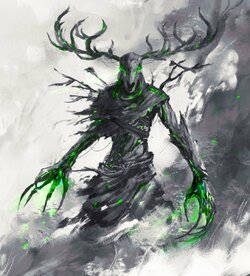The Cult of Qolnos was an ascetic religion with fairly unreasonable standards and little to offer for incentives to join, so they primarily took in orphans and trained them up as monks. Qolnos was the god of Purity; physical, mental, and philosophical. Adherents were to abstain from anything their ancient scholars had decided was impure, even as it applied to mixing naturally occurring substances, like mixed fiber clothes, anything but whole, unseasoned foods, and even using and wearing metal alloys and cut gems. Even virginity was revered as existing in the natural state in which one was born, and celibacy was mandatory. That was another reason the followers of Qolnos were eager to take in orphans.
The cult was tolerated mostly because their crusades could be often be directed towards pragmatic ends, such as crusading against necromancers and revolutions against corrupt leaders. As a vague form of payment, governments didn't stop them from enforcing their standards, such as banning the sale of spices and alcohol in the towns where they had monasteries.
While alchemy was heresy, most other academic pursuits were valued, such as history and the study of the natural world. This knowledge was merely to identify the inherent truths of the world, as to better maintain or force a return to those original truths. While all Qolnon monks trained their bodies as to achieve best what they could physically be, some also trained their minds as much in the accepted areas of study.
One such academic was Nasir. The young monk had barely any memory of his life before the Cult of Qolnos, and those memories were mostly of poverty and loneliness. Nasir barely knew what he was missing outside the ascetic religion in which he'd been raised. Inside, he found a passion for nature that was encouraged. The cult frowned on the domestication of plants and animals, but they begrudgingly acknowledged that that box couldn't be closed. However, their naturalists strove to locate, record, and encourage the growth of the most 'original' of species as to try and cultivate as natural a world as possible. Nasir saw the beauty in nature, and he was fulfilled by serving in this role.
Though, something was seeping out into the land that was changing, corrupting nature and man alike...
The cult was tolerated mostly because their crusades could be often be directed towards pragmatic ends, such as crusading against necromancers and revolutions against corrupt leaders. As a vague form of payment, governments didn't stop them from enforcing their standards, such as banning the sale of spices and alcohol in the towns where they had monasteries.
While alchemy was heresy, most other academic pursuits were valued, such as history and the study of the natural world. This knowledge was merely to identify the inherent truths of the world, as to better maintain or force a return to those original truths. While all Qolnon monks trained their bodies as to achieve best what they could physically be, some also trained their minds as much in the accepted areas of study.
One such academic was Nasir. The young monk had barely any memory of his life before the Cult of Qolnos, and those memories were mostly of poverty and loneliness. Nasir barely knew what he was missing outside the ascetic religion in which he'd been raised. Inside, he found a passion for nature that was encouraged. The cult frowned on the domestication of plants and animals, but they begrudgingly acknowledged that that box couldn't be closed. However, their naturalists strove to locate, record, and encourage the growth of the most 'original' of species as to try and cultivate as natural a world as possible. Nasir saw the beauty in nature, and he was fulfilled by serving in this role.
Though, something was seeping out into the land that was changing, corrupting nature and man alike...

 Your support makes Blue Moon possible (Patreon)
Your support makes Blue Moon possible (Patreon)
